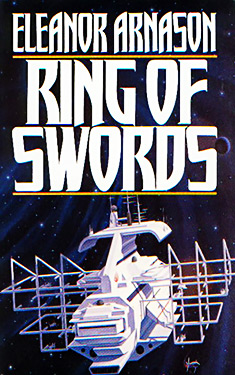Eleanor Arnason
Completed 8/14/2020, Reviewed 8/14/2020
4 stars
This was a very different take on
the first contact trope. The book
describes aliens responding to their first encounters with humans. It explores what it means to be “people” and
considers the topics of morality, war, sexuality, and gender politics. It’s an ambitious novel that worked pretty
well. My only beef with it was that the
names of the aliens were confusing, and that there were a lot of them. I often wasn’t sure who was talking, other
than two of the more prominent alien characters. But overall, I liked it, finding it
fascinating and well-written. This book
was nominated for an Otherwise Award for its exploration of gender issues.
 Anna Perez is a researcher of
intelligence in other species. The story
begins where she is working on another planet studying a species of jellyfish-like
creatures that communicate with flashes of light. A group of aliens called the Hwarhath come to
the planet to work out a peace treaty with humans. Their translator is Nicholas Sanders, an
earthling who was captured by the Hwarhath, became a turncoat and sided with
them. Anna becomes caught up in the
diplomatic endeavor, eventually being sent to a Hwarhath space station as an observer
for a new treaty after the first one fails.
Over the course of the talks, Anna learns about the society of the Hwarhath
and Nicholas’ tenuous relationship with them.
Anna Perez is a researcher of
intelligence in other species. The story
begins where she is working on another planet studying a species of jellyfish-like
creatures that communicate with flashes of light. A group of aliens called the Hwarhath come to
the planet to work out a peace treaty with humans. Their translator is Nicholas Sanders, an
earthling who was captured by the Hwarhath, became a turncoat and sided with
them. Anna becomes caught up in the
diplomatic endeavor, eventually being sent to a Hwarhath space station as an observer
for a new treaty after the first one fails.
Over the course of the talks, Anna learns about the society of the Hwarhath
and Nicholas’ tenuous relationship with them.
The society of the Hwarhath is
fascinating. It is divided along gender
lines. Women are nurturers and safe. They mostly stay on the home planet. Hwarhath men are aggressive and dangerous. They become soldiers in the society’s army,
searching space for enemies to bring war against. They are segregated from the women and
children upon reaching adulthood.
Children are conceived by artificial insemination to prevent the men
from harming the women and children.
Everyone in the society is homosexual and heterosexuality is seen as a
perversion. When they come across humans
in space, they are aghast that they are mostly heterosexual, believing them to
be barbarians for keeping the genders mixed.
In one confrontation, the Hwarhath
took Nicholas as a prisoner. He became a
traitor to Earth and joined the Hwarhath.
He also became lovers with a high ranking general in the military forces. It’s an unusual relationship with the
general, as these aliens are human-like, though fur covered, and it has not
been decided whether or not humans are people or animals. Nicholas’ primary role is as translator. He has taught the English language to several
of the Hwarhath. He develops a
friendship with Anna, as she is rare among humans to want to learn more about
the aliens rather than fear and fight them.
Anna is a great character, a scientist
of Mexican descent who is the first female human the Hwarhath get to know. She conveys human society to them. Through her interactions with the Hwarhath ,
with Nicholas, and through the peace negotiations, we learn all about their society
gradually rather than in one huge info dump.
There’s no sexual tension between Anna and Nicholas, which I found
refreshing. The only sexual relationship
that has any real development is of Nicholas and the general.
There was another character I
really liked. I remembered his name
because it was short, Mats. He is a
playwright who through Anna and Nicholas, learns about Shakespeare. He becomes fascinated by the plays and adapts
them to Hwarhath scenarios and moralities.
The first play he adapts is Macbeth.
The story is told in mostly
alternating chapters between an Anna-perspective third-person narration and
Nicholas’ first- person journal entries.
The story hangs together fairly well through the narration, although
there were a couple time jumps that confused me. I thought they could have been signified a
little more clearly.
I give the book four stars out of
five. It was a very interesting
read. It wasn’t full of action. It’s a philosophical discussion under the
guise of space opera. But it was still
intriguing. It was the reverse of the
usual story where earthlings are trying to decide if aliens are “human” or “people”
versus really smart animals or barbarians. If you’re looking for a smart take on first
contact stories with some deep meaning, this is the book for you.
No comments:
Post a Comment